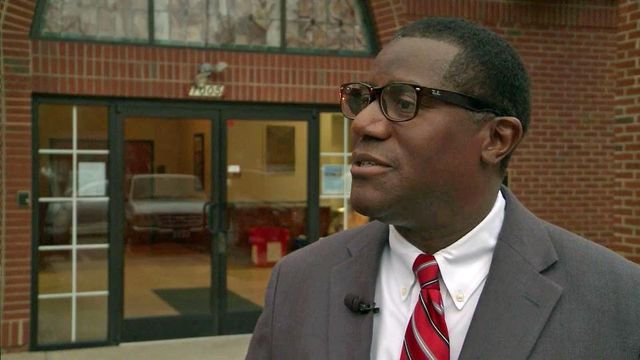Plain-clothes officer attended Moral Monday planning meetings
State NAACP president Rev. William Barber said he is concerned Raleigh police chose to conduct surveillance at the planning meetings, which were typically held in the sanctuary of a nearby church. Barber said his group had nothing to hide and that the officers would have been welcomed had they worn uniforms or introduced themselves.
Posted — UpdatedDeck-Brown said one plain-clothes officer attended two meetings at the Davie Street Presbyterian Church on May 6 and May 13, at the height of the Moral Monday protests.
"The purpose of the officer’s presence was to determine how many people were expecting to be arrested to allow the department to gauge the sufficiency of the logistical support, such as transport vehicles, available at the Legislative Building," Deck-Brown said.
About 940 people were arrested at the weekly Moral Monday rallies opposing GOP-backed policies that protesters said damaged public education, voting rights and working people. Raleigh police provided additional manpower to the North Carolina General Assembly Police during the protests, with city officers routinely being used to escort arrestees on their way to jail.
Councilwoman Mary-Ann Baldwin said city officials confirmed the surveillance to her on Monday following inquiries by The Associated Press.
"I was distressed to learn about this," said Baldwin, chairwoman of the council's Law and Public Safety Committee. "We were reluctant to even be involved because we don't think arresting people for speaking their minds is the right thing to do."
State NAACP president Rev. William Barber said he is concerned Raleigh police chose to conduct surveillance at the planning meetings, which were typically held in the sanctuary of a nearby church. Barber said his group had nothing to hide and that the officers would have been welcomed had they worn uniforms or introduced themselves.
"It's not like we were planning a bank heist," Barber said after learning of the surveillance. "Mostly what we did was pray and sing."
Rev. Earl Johnson, pastor of Martin Street Baptist Church, where some of the planning meetings were held, said people at some of the meetings told him they saw people they knew to be with the police department in plain clothes. Johnson said he didn't think anything of it at the time.
"I am upset they felt they needed to infiltrate the way they did," Johnson said. "There was nothing to hide."
The weekly planning meetings were announced in advance and typically open to the public. However, there were portions of the meetings during which news reporters were asked to leave so protesters could receive information from volunteer lawyers about what to expect if they were arrested. Barber said he is concerned that, if police officers were privy to the legal advice provided to protesters, then that may have violated the attorney-client privilege.
Deck-Brown said the officer only attended portions of the meeting that were open to the media and members of the public. She added that the department values its "close working relationship" with the NAACP.
"That relationship has contributed to safety and security, and it has proven to be beneficial to all involved," she said. "As always, the overarching goal of the police department was to ensure all parties were able to lawfully exercise their constitutional rights of assembly and free speech in a safe and orderly environment."
Johnson said Raleigh police officers treated protesters respectfully.
"Even when we were handcuffed and taken to jail, they showed nothing but courtesy and kindness to people who were there," he said.
Irv Joyner, a professor at the North Carolina Central University School of Law who is representing several of the protesters, said he and other defense lawyers are likely to seek copies of any police surveillance reports through court discovery motions.
The surveillance first came to light Friday at the trial of an activist arrested while at a Moral Monday protest in May. General Assembly Police Chief Jeff Weaver testified he received advance intelligence reports from another law enforcement agency about the protesters' plans.
Spokespeople for the State Bureau of Investigation, the state Department of Public Safety and the Wake County Sheriff's Office all told AP none of their personnel conducted surveillance on the NAACP.
Raleigh Mayor Nancy McFarlane said Monday that she was unaware of any police surveillance, but she expressed confidence the city's officers followed the law.
"The Raleigh Police Department uses a number of lawful means to gather information to protect the safety of the public," McFarlane said. "They always do that in a way that is respectful of the individual's Constitutional rights."
• Credits
Copyright 2024 by WRAL.com and the Associated Press. All rights reserved. This material may not be published, broadcast, rewritten or redistributed.






